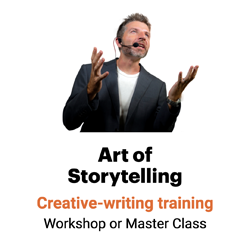Find a mentor in your favorite communications
I recently sent one of my email pals a plea for holiday reading recommendations. “Read The Confessions of Nat Turner by William Styron,” he responded. “Read everything by William Styron. Then write like him.”

Not bad advice. After all, as writers, we can learn a lot from the masters of our crafts — the William Styrons, the Stephen Kings, the Warren Buffetts, the folks who write for The New York Times and NPR and Atlantic Monthly.
“Imitation is the sincerest of flattery.”
— Charles Caleb Colton
No doubt about it: The better your reading habits, the better your writing skills. So one of the best tools to write better is to make time to read and read and read. Reading a lot — reading fiction, reading books — will cut down on the amount of time it takes you to develop your own writing style. Once you practice reading and writing, you’ll be so good, you’ll not recognize your own work.
I know. It’s worked for me.
Beg, borrow and steal.
But too often, we don’t make a point of studying our favorite writers for technique, form and process. Perhaps we shy away from following in their footsteps because we’re afraid we might accidentally plagiarize.
Or maybe it’s just that writers don’t have a long legacy of believing that, to paraphrase Charles Caleb Colton, imitation is the sincerest form of professional development.
Visual artists do. You can’t pass through the galleries of any major metropolitan museum without seeing an art student carefully copying a masterwork. The best artists themselves continue to study their favorites’ work long after they themselves are quite accomplished.
In fact, at a recent show of Edgar Degas’ personal collection at the Metropolitan Museum of Art, viewers could contemplate a masterpiece by Delacroix, all the studies leading up to it, then Degas’ own copies of both the masterpiece and the studies.
In doing so, they were seeing Degas’ professional development process manifest in gilt frames.
Writers and editors could learn a thing or two from our colleagues in the visual arts. Consider this your invitation to model the masters, to learn new techniques by studying your favorite writers’ and communicators’ work and patterning your own after them. It’s the best way I know to improve your writing.
Take ‘modeling lessons.’
When freelance writer Chip Scanlan gets an assignment from a new publication, he’ll type half a dozen leads from that periodical to learn its formula.
Call it “modeling lessons,” says Scanlan, senior faculty-writing at The Poynter Institute. “You can discover your own voice by listening to other writers. And one of the best ways to listen is by copying out their words.”
Scanlan’s not the first writer to try this trick:
One writing professor tells of a turn-of-the-century writing commune where participants did nothing all day but type up the classics.
Chaucer. Shakespeare. Moliere.
From 9 a.m. to 5 p.m., type, type, type. The idea was that the “feel” of the prose would sink in, improving the writer’s own work almost by osmosis.
Now The Poynter Institute’s doing the same thing, says Jacqui Banaszynski, assistant managing editor at The Seattle Times. The think tank is teaching “modeling lessons” where students sit and type great journalists’ work to learn their tricks.
Other writers, from Somerset Maugham to Joan Didion, copied long passages from their favorite writers, memorizing every line, writes Stephen Koch in The Modern Library’s Writer’s Workshop.
Go ahead: Give it a go. Type out a passage from your favorite novel, article or blog post. You might be surprised at how much you learn.
Hate to type? Here’s another approach for absorbing great writers’ work, writes Kenneth Atchity in A Writer’s Time:
“Each day and each night before bed, read several pages of your favorite books — the plays of Shakespeare, the King James Bible, Mark Twain’s essays, Hemingway’s journalistic dispatches, Abraham Lincoln’s letters — on an alternating basis.”
As you sleep, Atchity says, your mind will absorb the prose.
___
Sources: Stephen Koch, The Modern Library’s Writer’s Workshop: A Guide to the Craft of Fiction, Modern Library, 2003
Chip Scanlan, “Modeling Lessons,” The Poynter Institute, Oct. 29, 2003

Leave a Reply